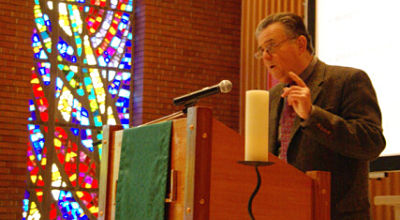Religious College Tackles 21st Century Atheism Head On
Talk about an unlikely course in an unlikely place.
The main chapel at Jesuit-run Regis College at the University of Toronto is adorned with stained glass windows, icons of Mary and Joseph, and the Stations of the Cross.
The eight-week course, which meets every Wednesday afternoon, is on atheism. Or more precisely, “Responding to 21st-Century Atheism.”
It’s an attempt, says Scott Lewis, for people of faith to understand and come to terms with the increasingly muscular secularism and atheism that has arisen in Western societies over the past generation.
Atheism “has become militant, aggressive and proselytizing,” said Lewis, a Jesuit scripture scholar, who teaches the class with three other scholars. “It’s made great in-roads and is now socially acceptable. If you’re young and educated and believe in God, you’re (seen as) a jerk.”
While the course examines the increasing polarization between non-believers and people of faith, it will not be about confronting secularists or engaging in polemics, Lewis stressed before the first class of about 155 students in the adult-education program.
Both sides need to lighten up, he said.
“One idea for atheists to leave behind is that people who believe are stupid or naive,” Lewis suggested. “And perhaps we should leave behind the idea that an atheist is someone who is not ethical or a good person.
“A person can be a believer and be quite intelligent. A person can be an atheist and be quite a morally upright person.”
It’s the first time in memory that a Catholic academic institution in Canada has formally explored non-belief, but it nonetheless reflects the times. Five universities in the U.S. have secular humanist chaplains, and the University of Toronto now has two.
“I think it’s very natural to offer this course,” said one of the two Toronto chaplains, Mary Beaty. “Universities are encountering more and more students asking these types of questions.”
A study last autumn by the Pew Research Center found the number of Americans who do not identify with any religion continues to grow at a rapid pace: One-fifth of the U.S. public, and a third of adults under 30, are religiously unaffiliated today, “the highest percentages ever in Pew Research Center polling.”
The study found that in the last five years alone, the unaffiliated have increased from just over 15 percent to just under 20 percent of all U.S. adults. Their ranks now include more than 13 million self-described atheists and agnostics (nearly 6 percent of the U.S. public), as well as nearly 33 million people who say they have no particular religious affiliation.
Other polls have suggested that as many as one in 10 U.S. adults are atheists.
Canadian census data show that atheists, agnostics, humanists and those with no religious affiliation account for 16 percent of the population, up 4 percentage points over the previous decade. They now represent the second-largest religious group in the country.
A Canadian Ipsos Reid poll released in 2011 found 30 percent of respondents did not believe in a deity.
However one parses the numbers, nonbelievers are undoubtedly getting bolder and even celebrated, as evidenced by best-seller lists in recent years. Lewis and other instructors conceded they will find it hard to avoid mentioning “New Atheist” authors Christopher Hitchens, Richard Dawkins and Sam Harris, but said they would not dwell on the trio.
Lewis said he’ll look at both sides of the debate. “What we will be focusing on is our response to individuals who have thrown down the gauntlet and say ‘To believe in God is not to be believe in science, and to believe in science is not to believe in God.’”
“There’s a little fundamentalism on both sides of the aisle.”
Central to the course will be the question of suffering—“the oldest religious question in the world,” Lewis said. “Why, if there’s a good God, do we have suffering, especially of the innocent?”
As for science and Darwinism, the biblical book of Genesis “is not a science book and should not be read as one. Our faith does not rise and fall on the age of the Earth.” And people of faith are at a threshold moment: “We cannot continue thinking of God in traditional ways and still accept Darwinian science.”
Lewis said it’s not uncommon for Catholic thinkers to believe in evolution. The course will include the work of the Rev. Pierre Teilhard de Chardin, a Jesuit priest who was also trained as a paleontologist and geologist. Teilhard de Chardin accepted Darwinism as fact as early as the 1930s, but his writings were condemned by the Vatican.
The course comprises two lectures from Lewis; a look at psychology and atheism from Jesuit psychologist Rev. Joe Schner, who will examine whether the human brain is hard-wired for religion; an examination of suffering by Michael Stoeber, who told the introductory class that the “New Atheists” tend to overemphasize “the underbelly of the Catholic Church”; and a theological and philosophical perspective from Jesuit Gordon Rixon.
Charisma News Asks: Is this the right response to the rise of secular humanism, atheism and agnosticism? How should Christians deal with the rise of these ‘isms’ in Western societies?





























